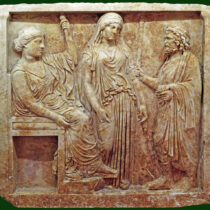The case of two female, eighty-four years old, folk musicians who live in the village Agistro in Eastern Macedonia is presented in this article. These women through lute playing and dancing express the concepts related to the special identity of their community, which consists of indigenous inhabitants and immigrants. Their female nature in combination with their capacity as folk musicians results to a very rare phenomenon not only in Eastern Macedonia, but also in Greece in general. Their attachment to lute playing and dancing is a simple everyday relationship, which is in perfect harmony with the traditional understanding of music and dance. We have to do here with a relationship of initiation rather than teaching, which is usually the case in modern societies. Furthermore, it is about a bond that the two women experience as “drunkenness”, as an exhilaration beyond natural boundaries, as a gift, a talent that is flowing in their veins. Thus, by approaching this very special and constant association of these two women with music and dance, we observe how they have managed, consciously or unconsciously, to overstep multiple diversities in their lives through this everyday practice.
Music and Dance in the Life of Two Women from Agistro, Serres
28 Aug 2012
by Archaeology Newsroom
- A
- A
- A


